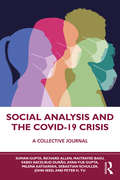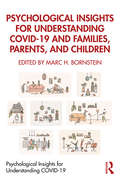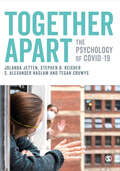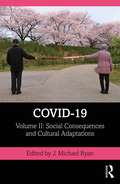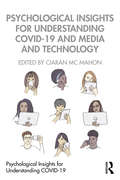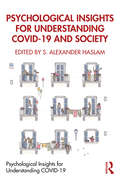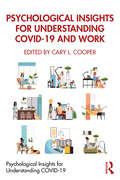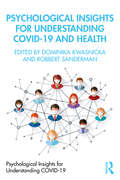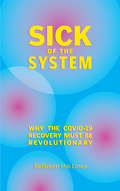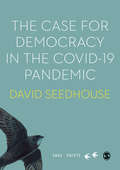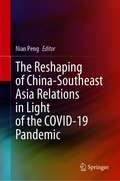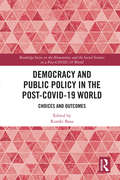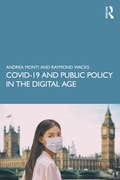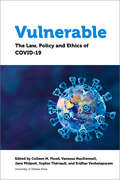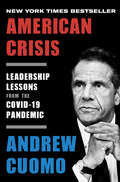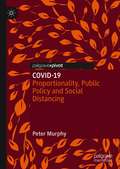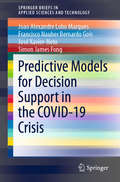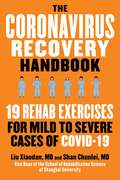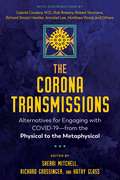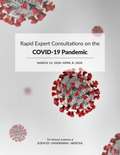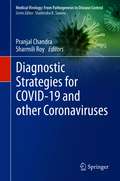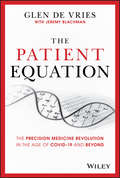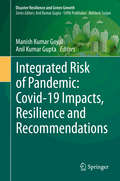Special Collections
Everything you ever wanted to know about the COVID-19 pandemic
- Table View
- List View
Social Analysis and the COVID-19 Crisis
by Richard Allen and Suman Gupta and John Seed and Maitrayee Basu and Fabio Akcelrud Durão and Ayan-Yue Gupta and Milena Katsarska and Sebastian Schuller and Peter H. TuThis book is a collective journal of the COVID-19 pandemic. With first-hand accounts of the pandemic as it unfolded, it explores the social and the political through the lens of the outbreak. Featuring contributors located in India, the United States, Brazil, the United Kingdom, Germany, and Bulgaria, the book presents us with simultaneous multiple histories of our time. The volume documents the beginning of social distancing and lockdown measures adopted by countries around the world and analyses how these bore upon prevailing social conditions in specific locations. It presents the authors’ personal observations in a lucid conversational style as they reflect on themes such as the reorganization of political debates and issues, the experience of the marginalized, theodicy, government policy responses, and shifts into digital space under lockdown, all of these under an overarching narrative of the healthcare and economic crisis facing the world. A unique and engaging contribution, this book will be useful to students and researchers of sociology, public health, political economy, public policy, and comparative politics. It will also appeal to general readers interested in pandemic literature.
Psychological Insights for Understanding COVID-19 and Families, Parents, and Children
by Marc H. BornsteinWith specially commissioned introductions from international experts, the Psychological Insights for Understanding COVID-19 series draws together previously published chapters on key themes in psychological science that engage with people’s unprecedented experience of the pandemic. This volume collects chapters that address prominent issues and challenges presented by the SARS-CoV-2 pandemic to families, parents, and children. A new introduction from Marc H. Bornstein reviews how disasters are known to impact families, parents, and children and explores traditional and novel responsibilities of parents and their effects on child growth and development. It examines parenting at this time, detailing consequences for home life and economies that the pandemic has triggered; considers child discipline and abuse during the pandemic; and makes recommendations that will support families in terms of multilevel interventions at family, community, and national and international levels. The selected chapters elucidate key themes including children’s worry, stress and parenting, positive parenting programs, barriers which constrain population-level impact of prevention programs, and the importance of culturally adapting evidence-based family intervention programs. Featuring theory and research on key topics germane to the global pandemic, the Psychological Insights for Understanding COVID-19 series offers thought-provoking reading for professionals, students, academics, policy makers, and parents concerned with the psychological consequences of COVID-19 for individuals, families, and society.
Together Apart
by Jolanda Jetten and S. Alexander Haslam and Stephen D. Reicher and Tegan CruwysWritten by leading social psychologists with expertise in leadership, health and emergency behaviour – who have also played an important role in advising governments on COVID-19 – this book provides a broad but integrated analysis of the psychology of COVID-19It explores the response to COVID-19 through the lens of social identity theory, drawing from insights provided by four decades of research. Starting from the premise that an effective response to the pandemic depends upon people coming together and supporting each other as members of a common community, the book helps us to understand emerging processes related to social (dis)connectedness, collective behaviour and the societal effects of COVID-19. In this it shows how psychological theory can help us better understand, and respond to, the events shaping the world in 2020. Considering key topics such as:LeadershipCommunicationRisk perceptionSocial isolationMental healthInequalityMisinformationPrejudice and racismBehaviour changeSocial DisorderThis book offers the foundation on which future analysis, intervention and policy can be built.We are proud to support the research into Covid-19 and are delighted to offer the finalised eBook for free.All Royalties from this book will be donated to charity.
COVID-19
by J. Michael RyanThe SARS-CoV-2 virus, and the associated COVID-19 pandemic, is perhaps the greatest threat to life, and lifestyles, the world has known in more than a century. The scholarship included here provides critical insights into the institutional responses, communal consequences, cultural adaptations, and social politics that lie at the heart of this pandemic. This volume maps out the ways in which the pandemic has impacted (most often disproportionately) societies, the successes and failures of means used to combat the virus, and the considerations and future possibilities – both positive and negative – that lie ahead. While the pandemic has brought humanity together in some noteworthy ways, it has also laid bare many of the systemic inequalities that lie at the foundation of our global society. This volume is a significant step toward better understanding these impacts. The work presented here represents a remarkable diversity and quality of impassioned scholarship and is a timely and critical advance in knowledge related to the pandemic. This volume and its companion, COVID-19: Volume I: Global Pandemic, Societal Responses, Ideological Solutions, are the result of the collaboration of more than 50 of the leading social scientists from across five continents. The breadth and depth of the scholarship is matched only by the intellectual and global scope of the contributors themselves. The insights presented here have much to offer not just to an understanding of the ongoing world of COVID-19, but also to helping us (re-) build, and better shape, the world beyond.
Psychological Insights for Understanding COVID-19 and Media and Technology
by Ciarán Mc MahonIn the Psychological Insights for Understanding COVID-19 series, international experts introduce important themes in psychological science that engage with people’s unprecedented experience of the pandemic, drawing together chapters as they originally appeared before COVID-19 descended on the world. This book explores how COVID-19 has impacted our relationship with media and technology, and chapters examine a range of topics including fake news, social media, conspiracy theories, belonging, online emotional lives and relationship formation, and identity. It shows the benefits media and technology can have in relation to coping with crises and navigating challenging situations, whilst also examining the potential pitfalls that emerge due to our increasing reliance on them. In a world where the cyberpsychological space is constantly developing, this volume exposes the complexities surrounding the interaction of human psychology with media and technology, and reflects on what this might look like in the future. Featuring theory and research on key topics germane to the global pandemic, the Psychological Insights for Understanding COVID-19 series offers thought-provoking reading for professionals, students, academics and policy makers concerned with the psychological consequences of COVID-19 for individuals, families and society.
Psychological Insights for Understanding COVID-19 and Society
by S. Alexander HaslamIn the Psychological Insights for Understanding COVID-19 series, international experts introduce important themes in psychological science that engage with people’s unprecedented experience of the pandemic, drawing together chapters as they originally appeared before COVID-19 descended on the world. This book explores how COVID-19 has impacted society, and chapters examine a range of societal issues including leadership and politics, community, social status, welfare, social exclusion and accountability. Addressing the social and psychological processes that structure, and are structured by, our social contexts, it shows not only how groups and individuals can come together to manage global crises, but also how these crises can expose weaknesses in our society. The volume also reflects on how we can work together to rebuild society in the aftermath of the pandemic, by cultivating a shared sense of responsibility through social integration and responsible leadership. Showcasing theory and research on key topics germane to the global pandemic, the Psychological Insights for Understanding COVID-19 series offers thought-provoking reading for professionals, students, academics and policy makers concerned with the psychological consequences of COVID-19 for individuals, families and society.
Psychological Insights for Understanding COVID-19 and Work
by Cary L. CooperIn the Psychological Insights for Understanding COVID-19 series, international experts introduce important themes in psychological science that engage with people’s unprecedented experience of the pandemic, drawing together chapters as they originally appeared before COVID-19 descended on the world. This timely and accessible book brings together a selection of chapters offering insights into issues surrounding work and the COVID-19 pandemic. Featuring content on topics such as health and wellbeing, work-family, flexible hours, organisational communication, talent management, recovery from work, employee engagement and flourishing, burnout, and organisational interventions, the book includes a specially written introduction contextualising the chapters in relation to the COVID-19 crisis. Reflecting on how psychological research is relevant during a significant global event, the introduction examines the potential future impact of the pandemic on the practice and study of psychology and our lives more generally. Featuring theory and research on key topics germane to the global pandemic, the Psychological Insights for Understanding COVID-19 series offers thought-provoking reading for professionals, students, academics and policy makers concerned with the psychological consequences of COVID-19 for individuals, families and society.
Psychological Insights for Understanding Covid-19 and Health
by Dominika Kwasnicka; Robbert SandermanWith specially commissioned introductions from international experts, the Psychological Insights for Understanding COVID-19 series draws together previously published chapters on key themes in psychological science that engage with people’s unprecedented experience of the pandemic. In this volume on health, Dominika Kwasnicka and Robbert Sanderman introduce chapters that explore the crucial topics of health behaviour change, wellbeing, stress, and coping. They highlight the key role digital health technologies can play in how we manage health conditions, and how we facilitate change to help individuals manage stressful situations such as physical isolation, job loss, and financial strain during the COVID-19 pandemic. The volume also offers an important overview of environmental and policy-based approaches to health behaviour change and addresses the highly relevant issues of identity and trust and how they shape the health of individuals, communities, and society. Highlighting theory and research on these key topics germane to the global pandemic, the Psychological Insights for Understanding COVID-19 series offers thought-provoking reading for professionals, students, academics, and policymakers concerned with psychological consequences of COVID-19 for individuals, families, and society.
Decarcerating Correctional Facilities during COVID-19
by Division of Behavioral and Social Sciences and Education and Committee on Law and Justice and National Academies of Sciences, Engineering, and Medicine and Committee on the Best Practices for Implementing Decarceration as a Strategy to Mitigate the Spread of COVID-19 in Correctional FacilitiesThe conditions and characteristics of correctional facilities - overcrowded with rapid population turnover, often in old and poorly ventilated structures, a spatially concentrated pattern of releases and admissions in low-income communities of color, and a health care system that is siloed from community public health - accelerates transmission of the novel coronavirus (SARS-CoV-2) responsible for COVID-19. Such conditions increase the risk of coming into contact with the virus for incarcerated people, correctional staff, and their families and communities. Relative to the general public, moreover, incarcerated individuals have a higher prevalence of chronic health conditions such as asthma, hypertension, and cardiovascular disease, making them susceptible to complications should they become infected. Indeed, cumulative COVID-19 case rates among incarcerated people and correctional staff have grown steadily higher than case rates in the general population. Decarcerating Correctional Facilities during COVID-19 offers guidance on efforts to decarcerate, or reduce the incarcerated population, as a response to COIVD-19 pandemic. This report examines best practices for implementing decarceration as a response to the pandemic and the conditions that support safe and successful reentry of those decarcerated.
Sick of the System
by John Clarke and Richard Swift and Emma Jackson and Justin Piché and Alberto Toscano and Jamie Swift and Harry Glasbeek and Gary Kinsman and Kai Cheng Thom and Robyn Maynard and Andrew Jackson and Anita Girvan and James T. Brophy and Nicole Marie Burton and Dallas Hunt and El Jones and Margaret M. Keith and Julie S. Lalonde and Wayne Lewchuk and Jane E. McArthur and Alexander McClelland and Karen Messing and Elaine Power and Gina Starblanket and Hugh D.A. GoldringFamilies left grieving; small businesses shuttered; communities in lockdown; precarious workers set adrift; health care workers stressed beyond endurance. The COVID-19 pandemic has shaken the world to its core. But the cracks already ran deep. Featuring essays on poverty, health care, incarceration, basic income, policing, Indigenous communities, and more, this anthology delivers a stinging rebuke of the pre-pandemic status quo and a stark exposé of the buried weaknesses in our social and political systems. As policy makers scramble to bail out corporations and preserve an unsustainable labour market, an even greater global catastrophe – in the form of ecological collapse, economic recession, and runaway inequality – looms large on the horizon. What can we do? From professors to poets, the authors of Sick of the System speak in one voice: We can turn our backs on “normal.” We can demand divestment, redistribution, and mutual aid. We can seize new forms of solidarity with both hands. As the world holds its breath, revolutionary ideas have an unprecedented chance to gain ground. There should be no going back.
The Case for Democracy in the COVID-19 Pandemic
by David SeedhouseOne moment life was normal, the next, governments around the world were imposing radical lockdowns of their populations. But why were decision-makers so readily ignoring centuries of hard-won civil freedoms? Where was the discussion of ethics and human rights? Why were we so easily controlled and why were our controllers so willing to do it? In The Case for Democracy, David Seedhouse explores the psychological biases; distorted risk perceptions; frenetic journalism; the disputed science; the narrow focus of ′experts′; value judgements dressed up as truths; propaganda; the invisibility of ethics; and the alarming irrelevance of inclusive democracy that have been features of governmental responses to the covid-19 pandemic. Seedhouse argues that the chaotic governmental response to Coronavirus, with no attempt to include the public, is the perfect argument for an extensive, participatory democracy; a democracy that demonstrates practical decision making by listening to everyone’s knowledge and expertise. Now is the time for us to solve our problems together.
The Case for Democracy in the COVID-19 Pandemic
by David SeedhouseOne moment life was normal, the next, governments around the world were imposing radical lockdowns of their populations. But why were decision-makers so readily ignoring centuries of hard-won civil freedoms? Where was the discussion of ethics and human rights? Why were we so easily controlled and why were our controllers so willing to do it? In The Case for Democracy, David Seedhouse explores the psychological biases; distorted risk perceptions; frenetic journalism; the disputed science; the narrow focus of ′experts′; value judgements dressed up as truths; propaganda; the invisibility of ethics; and the alarming irrelevance of inclusive democracy that have been features of governmental responses to the covid-19 pandemic. Seedhouse argues that the chaotic governmental response to Coronavirus, with no attempt to include the public, is the perfect argument for an extensive, participatory democracy; a democracy that demonstrates practical decision making by listening to everyone’s knowledge and expertise. Now is the time for us to solve our problems together.
The Reshaping of China-Southeast Asia Relations in Light of the COVID-19 Pandemic
by Nian PengThis book aims to examine the multiple effects of the COVID-19 pandemic on China-Southeast Asia relations from both Chinese and Southeast Asian perspectives. It invites many officials and scholars from the leading think-tanks and famous universities in China and Southeast Asian states to contribute and tries to reveal how has China-Southeast Asia relations been reshaping during/after the COVID-19 pandemic and discuss what kind of measures could be taken to push forward China-Southeast Asia relations and thus ensuring the peace and prosperity in the region. The main content of this book is divided into 10 parts, in which the first chapter briefly introduces the COVID-19 situation in China and Southeast Asia, China’s anti-COVID efforts, and the impacts of the COVID-19 on China-Southeast Asia relations from Chinese and Southeast Asian perspectives. Chapter 2 examines the dual influence of the pandemic on the construction of China-ASEAN community of a shared future and gave some useful policy recommendations on improving China-Southeast Asia relations. The following 8 chapters go deep into the Southeast Asian states’ response to COVID-19 and the economic, political and social effects of the COVID-19 on Southeast Asia–China relations, and look forward the future development of such relations. In addition, it also analyzes Southeast states’ reactions to the intense Sino-US power rivalry during/after the COVID-19 pandemic.This book is probably the first comprehensive study that investigates the impacts of the COVID-19 pandemic on China–Southeast Asia relations from both Chinese and Southeast Asian perspectives. It would not only open up a new area of study on China and Southeast Asia relations, but provide insightful observations and useful information for governments, companies and social organizations to facilitate cooperation in trade and investment, public health, and people-to-people exchanges. Therefore, the intended readership not only includes the academics but also officials, businessmen, journalists and social activists.The most important feature of this book is that it points out China–Southeast Asia relations would be reshaped by COVID-19 in the long run and analyzes how it would be reshaped. It also shows a well-balanced view on the COVID-19 and China–Southeast Asia relations as both university scholars, think-tank experts and government officials are involved in this book.
Democracy and Public Policy in the Post-COVID-19 World
by Rumki BasuAfter the COVID-19 disaster, ‘old’ frailties and inadequacies in agriculture and industrial productive capacities, in public health and transport systems have evinced sharply in the open, reopening the debates over public policy reforms as never before. This volume: Studies the likely impact of the COVID-19 pandemic on future policy making in India and other democracies. Critically looks at the available theoretical frameworks, models and approaches used in the policy making process and studies their contemporary relevance. Balances theoretical approaches with concrete case studies. Examines India’s policies on education, health, e-governance, gender and work, and also provides recommendations for the future. An important and timely contribution, this book will be of great interest to scholars and researches of public administration, public policy, political theory, globalization and global democracy.
COVID-19 and Public Policy in the Digital Age
by Raymond Wacks and Andrea MontiCOVID-19 and Public Policy in the Digital Age explores how states and societies have responded to the COVID-19 pandemic and their long-term implications for public policy and the rule of law globally. It examines the extent to which existing methods of protecting public safety and national security measure up in a time of crisis. The volume also examines how these ideas themselves have undergone transformation in the context of the global crisis. This book: Explores the intersection of public policy, individual rights, and technology; Analyzes the role of science in determining political choices; Reconsiders our understanding of security studies on a global scale arising out of antisocial behaviour, panic buying, and stockpiling of food and (in the United States) arms; Probes the role of fake news and social media in crisis situations; and Provides a critical analysis of the notion of global surveillance in relation to the pandemic. A timely, prescient volume on the many ramifications of the pandemic, this book will be essential reading for professionals, scholars, researchers, and students of public policy, especially practitioners working in the fields of technology and society, security studies, law, media studies, and public health.
Vulnerable
by Ravi Malhotra and Jeffrey Simpson and Paul Daly and David Robitaille and Jomo Kwame Sundaram and Katherine Fierlbeck and Grégoire Webber and Pat Armstrong and Hugh Armstrong and Jane Philpott and Delphine Nakache and Ivy Bourgeault and Daniel Weinstock and Aimée Craft and Anis Chowdhury and Teresa Scassa and Chidi Oguamanam and E. Richard Gold and Olivia Lee and Carissima Mathen and Steven J. Hoffman and Vanessa Gruben and Martha Jackman and Bryan Thomas and Lorian Hardcastle and Deborah McGregor and Jeffery Hewitt and Michelle Giroux and Amir Attaran and Adam R. Houston and Alexandra Flynn and Mel Cappe and Tim Caulfield and Marie-France Fortin and Jennifer A. Quaid and Dr Kumanan Wilson and Kelly Bronson and Jason Millar and Vardit Ravitsky and Terry Skolnik and Yves Le Bouthillier and Martine Lagacé and Linda Garcia and Leilani Farha and Kaitlin Schwan and Adelina Iftene and Jamie Chai Liew and Y. Y. Chen and Anne Levesque and Dr Kwame McKenzie and Jennifer A. Chandler and Dr Mona Gupta and Yasmin Khaliq and Simon Hatcher and Tess Sheldon and Katherine Lippel and Louise Bélanger-Hardy and Sarah Berger Richardson and Sam Halabi and Patrick Fafard and Céline Castets-Renard and Eleonore Fournier-Tombs and Jeremy De Beer and Matthew Herder and Jason W. NickersonThe novel coronavirus SARS-CoV-2, which causes the disease known as COVID-19, has infected people in 212 countries so far and on every continent except Antarctica. Vast changes to our home lives, social interactions, government functioning and relations between countries have swept the world in a few months and are difficult to hold in one’s mind at one time. That is why a collaborative effort such as this edited, multidisciplinary collection is needed. This book confronts the vulnerabilities and interconnectedness made visible by the pandemic and its consequences, along with the legal, ethical and policy responses. These include vulnerabilities for people who have been harmed or will be harmed by the virus directly and those harmed by measures taken to slow its relentless march; vulnerabilities exposed in our institutions, governance and legal structures; and vulnerabilities in other countries and at the global level where persistent injustices harm us all. Hopefully, COVID-19 will forces us to deeply reflect on how we govern and our policy priorities; to focus preparedness, precaution, and recovery to include all, not just some. Published in English with some chapters in French.
American Crisis
by Andrew CuomoGovernor Andrew Cuomo tells the riveting story of how he took charge in the fight against COVID-19 as New York became the epicenter of the pandemic, offering hard-won lessons in leadership and his vision for the path forward. When COVID-19 besieged the United States, New York State emerged as the global “ground zero” for a deadly contagion that threatened the lives and livelihoods of millions. Quickly, Governor Andrew Cuomo provided the leadership to address the threat, becoming the standard-bearer of the organized response the country desperately needed. With infection rates spiking and more people dying every day, the systems and functions necessary to combat the pandemic in New York—and America—did not exist.
So Cuomo undertook the impossible. He unified people to rise to the challenge and was relentless in his pursuit of scientific facts and data. He quelled fear while implementing an extraordinary plan for flattening the curve of infection. He and his team worked day and night to protect the people of New York, despite roadblocks presented by a president incapable of leadership and addicted to transactional politics. Taking readers beyond the candid daily briefings that became must-see TV across the globe, and providing a dramatic, day-by-day account of the catastrophe as it unfolded, American Crisis presents the intimate and inspiring thoughts of a leader at an unprecedented historical moment.
In his own voice, Andrew Cuomo chronicles the ingenuity and sacrifice required of so many to fight the pandemic, sharing the decision-making that shaped his policy as well as his frank accounting and assessment of his interactions with the federal government, the White House, and other state and local political and health officials. Real leadership, he shows, requires clear communication, compassion for others, and a commitment to truth-telling—no matter how frightening the facts may be. Including a game plan for what we as individuals—and as a nation—need to do to protect ourselves against this disaster and those to come, American Crisis is a remarkable portrait of selfless leadership and a gritty story of difficult choices that points the way to a safer future for all of us.
A New York Times Bestseller
COVID-19
by Peter MurphyCOVID-19: Proportionality, Public Policy and Social Distance explores the social and political response to the COVID-19 pandemic. It details the sociological aspects of the spread of the virus, the role played by social distancing in virus mitigation, and the comparative effect of social proximity and distance on national anti-viral behavior. Peter Murphy discusses various public policy approaches to the pandemic and their successes and failures. In this engaging analysis, he investigates the way that contemporary societies think about risk, threat and harm, and how social mood affected the response to COVID-19.
Predictive Models for Decision Support in the COVID-19 Crisis
by Simon James Fong and Joao Alexandre Marques and Francisco Nauber Gois and José Xavier-NetoCOVID-19 has hit the world unprepared, as the deadliest pandemic of the century. Governments and authorities, as leaders and decision makers fighting the virus, enormously tap into the power of artificial intelligence and its predictive models for urgent decision support. This book showcases a collection of important predictive models that used during the pandemic, and discusses and compares their efficacy and limitations. Readers from both healthcare industries and academia can gain unique insights on how predictive models were designed and applied on epidemic data. Taking COVID19 as a case study and showcasing the lessons learnt, this book will enable readers to be better prepared in the event of virus epidemics or pandemics in the future.
The Coronavirus Recovery Handbook
by Liu Xiaodan and Shan ChunleiFrom Dr. Liu Xiaodan and Dr. Shan Chunlei and their colleagues at the Shanghai Public Health Clinical Center and Lei Shenshan Hospital in Wuhan, comes a must-have guide for recovering and rehabbing after contracting the coronavirus (COVID-19). The Center for Disease Control and Prevention in the US and the World Health Organization have declared the coronavirus a worldwide health emergency. With the virus in 210 countries around the world, much focus is on the growing number of new cases. But how should those who have already contracted the virus start the recovery process? According to the clinical needs of mild and severe COVID-19 patients, The Coronavirus Recovery Handbook puts forward a series of lung rehabilitation training methods of integrated traditional Chinese and western medicine, which have been used in the Shanghai Public Health Clinical Center (affiliated to Fudan University) and Lei Shenshan Hospital in Wuhan. The pulmonary-based Qigong rehabilitation protocol (PQRP) featured in the handbook was created by Dr. Liu Xiaodan to aide in the recuperation of COVID-19 patients. Qigong is a centuries-old system of coordinated body-posture and movement, breathing, and meditation used for the purposes of health, spirituality, and martial-arts training. This is the first authoritative, comprehensive guide to recovering and rehabbing from COVID-19 with 19 easy-to-follow traditional Chinese exercises. Written in plain language, here is information that will help readers and professionals recuperate from this devastating virus. As COVID-19 continues to spread around the world—China, South Korea, Iran, Italy, Germany, the United Kingdom, Canada, and the United States—and cases continue to rise in number, the ability to regain one’s strength, especially in the lungs, is imperative. Led by Dr. Liu Xiaodan and Dr. Shan Chunlei, The Coronavirus Recovery Handbook was created by the rehabilitation medicine team of Shanghai University of Traditional Chinese Medicine, based on their previous clinical and scientific research work, combined with relevant national diagnosis and treatment guidance and the clinical experience of many experts involved in the fight against this epidemic. With 19 exercises for individuals to utilize in their recovery from COVID-19, the information in this handbook could be lifesaving. If the worst should happen, the information in this book will help you recover your strength after fighting COVID-19.
The Corona Transmissions
by Sherri Mitchell, Richard Grossinger and Kathy Glass• Includes contributions from 35 well-known authors, doctors, herbalists, First Nations teachers, economists, astrologers, and others, such as Richard Strozzi-Heckler, Annabel Lee, Matthew Wood, Gabriel Cousens, M.D., Rob Brezsny, and Robert Simmons • All royalties for this book go to the Land Peace foundation, serving First Nations tribes in Maine The pandemic of Coronavirus Disease 2019 (COVID-19) is the biggest event of our lifetimes. This global experience has affected human history, ecology, epidemiology, and supply chains with the suddenness of 9/11, yet with a far greater extent, duration, and toll--the end of which is not yet in sight. Exploring a broad spectrum of new perspectives on COVID-19, from the physical to the metaphysical, from ecological to political, from apocalyptic to proto-utopian, and from scientific facts and health tips to imaginings, visionings, poems, and awakenings, this anthology offers an antidote to the barrage of data and speculation from the mainstream. The 35 contributors, including Laura Aversano, Charles Eisenstein, Zoe Brezsny, Meryl Nass, M.D., Bobby Byrd, and Joel and Michelle Levey, address the virus as a fellow being, allowing it to speak to us and through us. They attempt to describe, understand, interpret, and decipher the virus at biological, serological, epidemiological, social, political, astrological, and ontological levels. The virus is explored in terms of cultural critique, divination, prophecy, warning, elucidation, and opportunity. Medical doctors, herbalists, naturopaths, indigenous healers, and homeopathic physicians tell us about coronavirus history, treatments, and prevention protocols; yoga teachers about cultivating inner balance and harmony; and economists, poets, psychotherapists, and First Nations teachers about the vast effects of the virus and the way forward. They explore how the disease speaks directly and how it meticulously addresses our relationship to Gaia, to its animal, plant, and mineral kingdoms, to each other, and to the economies and dystopia we have created. As a visionary whole, The Corona Transmissions asks you to respond, to engage your wisdom and creative imagination, to resist easy categorization and resolutions, and to participate in a collective dance and chant for healing, peace, equality, and a habitable future. Viruses do not live except by virtue of us carrying them. We are the living ones and our bodies, minds, hearts, and spirits will prevail.
Rapid Expert Consultations on the COVID-19 Pandemic
by Engineering and Medicine and National Academies of SciencesIn response to a request from the Office of Science and Technology Policy and the Office of the Assistant Secretary for Preparedness and Response, the National Academies of Sciences, Engineering, and Medicine convened a standing committee of experts to help inform the federal government on critical science and policy issues related to emerging infectious diseases and other 21st century health threats. This set of Rapid Expert Consultations are the first of their kind and represent the best evidence available to the Committee at the time each publication was released. The science on these issues is continually evolving, and the scientific consensus the Committee reaches on these topics will likely evolve with it. The standing committee includes members with expertise in emerging infectious diseases, public health, public health preparedness and response, biological sciences, clinical care and crisis standards of care, risk communication, and regulatory issues.
Diagnostic Strategies for COVID-19 and other Coronaviruses
by Pranjal Chandra and Sharmili RoyThis book provides fundamental information on various techniques for the detection of SARS-CoV-2 including reverse transcriptase (RT) PCR, loop-mediated isothermal amplification, immunodiagnostic tests, and CRISPR-Cas. It reviews various testing kits and detection methodologies that are currently being used for the detection of SARS-CoV-2 and examines strategies for the post-treatment detection and monitoring of SARS-CoV-2. Further, it assesses the diagnostic potential of several SARS-CoV-2 proteins; and analyzes their structural determinants and immunogenicity.In turn, the book evaluates the potential of CRISPR-Cas 12-based assays for the detection of SARS-CoV-2 using RNA extracted from patients. Lastly, it discusses the use of miniaturized biosensors for the detection of other types of coronavirus.
The Patient Equation
by Glen de VriesHow the data revolution is transforming biotech and health care, especially in the wake of COVID-19—and why you can’t afford to let it pass you by We are living through a time when the digitization of health and medicine is becoming a reality, with new abilities to improve outcomes for patients as well as the efficiency and success of the organizations that serve them. In The Patient Equation, Glen de Vries presents the history and current state of life sciences and health care as well as crucial insights and strategies to help scientists, physicians, executives, and patients survive and thrive, with an eye toward how COVID-19 has accelerated the need for change. One of the biggest challenges facing biotech, pharma, and medical device companies today is how to integrate new knowledge, new data, and new technologies to get the right treatments to the right patients at precisely the right times—made even more profound in the midst of a pandemic and in the years to come. Drawing on the fascinating stories of businesses and individuals that are already making inroads—from a fertility-tracking bracelet changing the game for couples looking to get pregnant, to an entrepreneur reinventing the treatment of diabetes, to Medidata's own work bringing clinical trials into the 21st century—de Vries shares the breakthroughs, approaches, and practical business techniques that will allow companies to stay ahead of the curve and deliver solutions faster, cheaper, and more successfully—while still upholding the principles of traditional therapeutic medicine and reflecting the current environment. How new approaches to cancer and rare diseases are leading the way toward precision medicine What data and digital technologies enable in the building of robust, effective disease management platforms Why value-based reimbursement is changing the business of life sciences How the right alignment of incentives will improve outcomes at every stage of the patient journey Whether you're a scientist, physician, or executive, you can't afford to let the moment pass: understand the landscape with this must-read roadmap for success—and see how you can change health care for the better.
Integrated Risk of Pandemic: Covid-19 Impacts, Resilience and Recommendations
by Anil Kumar Gupta and Manish Kumar GoyalIn light of the novel corona virus outbreak in December 2019 and its subsequent impact on entire world as a global pandemic, the book attempts to provide integrated risk assessment on Covid -19 like pandemics, as well as to understand the societal, environment and economic impact of the outbreak in various sectors of development. It covers fundamental factors of global disease outbreaks and its coverage as major disaster through the complexity and severity of consequences, illustrating the dimensions of low frequency high intensity disasters. It brings together broad range of topics including basic concepts, isolation measure, role of governance and key technical advancements for containing the diseases. In addition, it also covers resilience analysis towards the impacts such outbreaks have on bio-diversity, ecosystem services and agricultural food production. It defines key exit strategies from the lessons learned and success stories of historical disease outbreaks. The book is presented in four parts, where part 1 familiarizes with fundamentals; part 2 focuses on integrated risk assessments; part 3 focuses on various measures and strategies of resilience; and part 4 suggests key lessons and recommendations. The book is a useful reading reference for scientific community, policy makers and professionals across the domains of health, environment, disasters and sustainable development. Book is specifically beneficial for postgraduate students, researchers, planners and field professionals.
